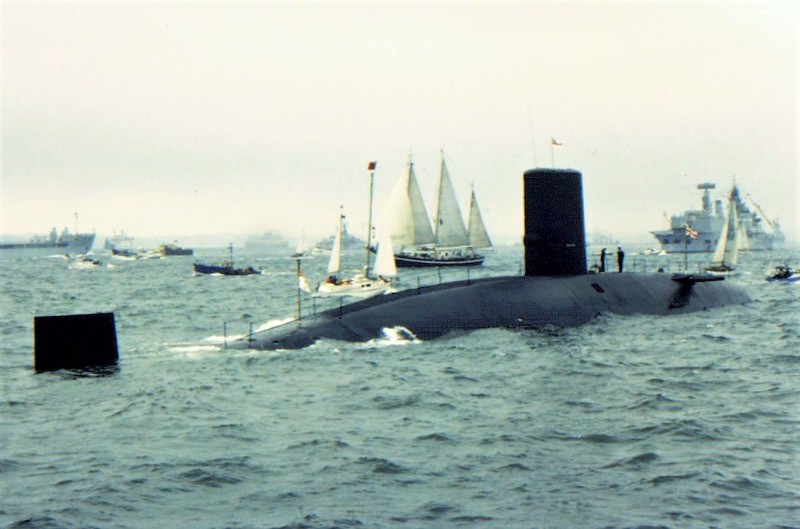
Finest Hour 195
Life in a World Controlled by the Scientists

HMS Churchill leaving port
October 21, 2022
Finest Hour 195, First Quarter 2022
Page 04
David Freeman, January 2022
In 1937 Winston Churchill wrote a series of articles for the News of the World under the general heading “Great Events of Our Time.” In the tenth article, published on 31 October, Churchill illustrated a “Vision of the Future through Eyes of Science,” ending with speculation about atomic power. In his next article, published one week later and reprinted here, Churchill picked up where he left off, as he turned to considering the social and ethical consequences of “Life in a World Controlled by the Scientists.” Both articles reflect the vast extent to which Prof. Frederick Lindemann kept Churchill informed about scientific developments, but the possible ramifications described here are pure Churchill.
In reaching last week the fringes of mankind’s future life, if the promise of science is fulfilled, I suggested that there exists a source of energy a million times greater than coal which we have not yet learned to harness or apply. That energy lies in the atom. For example: If one could induce the atoms of hydrogen in the Serpentine to combine to form helium they would produce enough heat to change the whole climate of England for a year.
We are startled today when we hear that a man has travelled from London to Baghdad between sunrise and sunset. If nuclear power were available, the journey from London to New York would probably be quicker than today from London to Brighton. Even inter-planetary communication would be a practical proposition. It is by no means impossible that the grandson of somebody now living will be the first to land on the cold, arid wastes of Mars, or to explore the hot, moist, tropical surface of Venus. Such possibilities dwarf the effects of the immediately foreseeable developments in wireless, telephones and television. Yet these are far-reaching. Already we are told that whole regiments of Japanese soldiers are equipped with small receiving sets carried in their helmets. The effects on tactics may be imagined if men, miles apart, can all hear and obey the same order.
The extension of this to civilization is but a step. The power of modern propaganda, already terrifying in its manifestations in the totalitarian States, will be carried to a new pitch. We shall all have a bee in our bonnet. Perfected television and perfect wireless telephones may prove the doom of the speculator in real property. The congregation of men in cities may well become superfluous if one can hear and take part in a conversation a hundred miles away as though one were sitting in the room face to face.

2024 International Churchill Conference
But these changes in modes of human existence produced by an improved technique in handling inanimate matter may well be overshadowed by the extraordinary problems biological inventions will raise. The development of foods and drugs has been very much a matter of chance in the past. It is improbable that it will remain so. Synthetic nourishment has hitherto always endeavoured to stimulate the natural food to which we are accustomed, but it is quite possible that new chemical substances will be made which are as wholesome and perhaps even more palatable and stimulating.
Alcohol, which probably first impinged upon the consciousness of mankind soon after vessels for storing fruit juice became available, is, of course, the oldest drug we know. The later cocaine derivatives, like opium and hashish, have made the name a bugbear to Western ears. This is due, no doubt, to their habit-forming nature, a characteristic from which even alcohol is not entirely exempt. There is no reason why drugs should not be produced capable of giving all the agreeable stimulation and experiences of these others without doing physical harm or giving rise to an irresistible craving. Such, no doubt, will be developed in the coming century, and will enable everybody to purchase without risk to health some hours of pleasure and exhilaration whenever he feels so disposed.

The conquest of sleep may well follow in the train of such discoveries. There is no real reason why six or eight of each twenty-four hours should be spent in a state of suspended animation. It may be a long time before complete immunity can be purchased, but it seems very probable that methods may be discovered to enable one to dispense without strain with sleep for days or weeks on end, and to take it in doses of any convenient length when the time can be spared. After all, many animals can go into cold storage for the winter, and there seems no reason why it should not be possible to extend this comfortable escape from reality to humanity at large.
Indeed, it is conceivable that those who desire it will be able to have themselves put on the shelf for ten or fifteen years to be resuscitated according to instructions, and make a fresh start on some given date without having grown any older in the interval. Here would be a good way to save money. But alas, what happens if Communists get hold of it while Rip Van Winkle is asleep?
Many of our problems today are due to the increased span of life to which we can all look forward. This tendency may well increase.
We may imagine the difficulties and complications which will arise if it becomes possible for people not only to extend their life to 120 or 150 years, but to take it in instalments so that one person may be sometimes older or sometimes younger than the other in the years they have actually used. Personally I am going on as I have done. But no doubt this is only diehard prejudice.
The possibility of systematic interference with the human mind is beginning to become apparent in many parts of Europe. But this science is only in its infancy. The influence of great preachers and orators has frequently been somewhat disparagingly attributed to mass suggestion. When all modes of communication are centralized and all information is canalized, no great oratorical power is required to produce the same effect.
The Jesuits said: “If you give me a child for its first five years, I do not mind who has him afterwards.” Scientific suggestion in the first few years of an infant’s life would probably give a bent to the mind that nothing later could eradicate. In the hands of a ruthless dictatorship these possibilities will indubitably be exploited. To those of us who believe that progress depends upon individuals rather than that individuals exist for the State, the results will be appalling. But the arguments are plausible, and in many countries not even arguments are tolerated before new scientific possibilities are put into action.
Awful developments lie already just beyond our fingertips in the breeding of human beings, and the shaping of human nature. It used to be said, “Though you have taught the dog more tricks, you cannot alter the breed of the dog.” But that is no longer true.
A few years ago London was surprised by a play called Rossum’s Universal Robots. The production of such beings may well be possible within fifty years. They will not be made, but grown under glass. There seems little doubt that it will be possible to carry out in artificial surroundings the entire cycle which now leads to the birth of a child. Interference with the mental development of such beings, expert suggestion and treatment in the earlier years, would produce beings specialized to thought or toil. The production of creatures, for instance, which have admirable physical development, with their mental endowment stunted in particular directions, is almost within the range of human power. A being might be produced capable of tending a machine, but without other ambitions.
Our minds recoil from such fearful eventualities, and the laws of Christian civilization will prevent them. But might not lop-sided creatures of this type fit in well with the Communist doctrines of Russia? Might not the Union of Soviet Republics, armed with all the power of science, find it in harmony with all their aims to produce a race adapted to mechanical tasks and with no other idea but to obey the Communist State?
The present nature of man is tough and resilient. It casts up its sparks of genius in the darkest and most unexpected places. But Robots could be made to fit the grisly theories of Communism. There is nothing in the philosophy of Communists to prevent their creation.
I have touched upon this sphere only lightly, but with a purpose of pointing out that in a future which our children may live to see, powers will be in the hands of men altogether different from any by which human nature has been moulded. Explosive forces, energy, materials, machinery will be available upon a scale which can annihilate whole nations. Despotism and tyrannies will be able to prescribe the lives and even the wishes of their subjects in a manner never known since time began. If to these tremendous and awful powers is added the pitiless subhuman wickedness which we now see embodied in powerful reigning governments, who shall say that the world itself will not be wrecked, or, indeed, that it ought not to be wrecked?
There are nightmares of the future from which a fortunate collision with some wandering star, reducing the earth to incandescent gas, might be a merciful deliverance.
Certain it is that while men are gathering knowledge and power with ever-increasing measureless speed, their virtues and their wisdom have not shown any notable improvement as the centuries have rolled. The brain of a modern man does not differ in essentials from that of the human beings who fought and loved here millions of years ago. The nature of man has hitherto remained practically unchanged. Under sufficient stress—starvation, terror, warlike passion, or even cold, intellectual frenzy—the modern man we know so well will do the most terrible deeds, and his modern woman will back him up.
At the present moment the civilizations of many different ages co-exist together in the world, and their representatives meet and converse. Englishmen, Frenchmen, or Americans with ideas abreast of the twentieth century do business with Indians or Chinese, whose civilizations were crystalized several thousands of years ago. We have the spectacle of the powers and weapons of man far out-stripping the march in his intelligence; we have the march of his intelligence proceeding far more rapidly than the development of his nobility. We may well find ourselves in the presence of “the strength of civilization without its mercy.”
It is, therefore, above all things, important that the moral philosophy and spiritual conceptions of men and nations should hold their own amid these formidable scientific evolutions. It would be much better to call a halt in material progress and discovery rather than to be mastered by our own apparatus and the forces which it directs. There are secrets too mysterious for man in his present state to know; secrets which once penetrated may be fatal to human happiness and glory.
But the busy hands of the scientists are already fumbling with the keys of all the chambers hitherto forbidden to mankind. Without an equal growth of Mercy, Pity, Peace and Love, Science herself may destroy all that makes human life majestic and tolerable. There never was a time when the hope of immortality and the disdain of earthly power and achievement were more necessary for the safety of the children of men.
After all, this material progress, in itself so splendid, does not meet any of the real needs of the human race. I read a book the other day which traced the history of mankind from the birth of the Solar system to its extinction. There were fifteen or sixteen races of men, which in succession rose and fell over periods measured by tens of millions of years. In the end a race of beings was evolved which had mastered nature. A State was created whose citizens lived as long as they chose, enjoyed pleasures and sympathies incomparably wider than our own, navigated the inter-planetary spaces, could recall the panorama of the past and foresee the future. But what was the good of all that to them? What did they know more than we know about the answers to the simple questions which man has asked since the earliest dawn of reason—“Why are we here? What is the purpose of life? Whither are we going?”
No material progress, even though it takes shapes we cannot now conceive, or however it may expand the faculties of man, can bring comfort to his soul. It is this fact, more wonderful than any science can reveal, which gives the best hope that all will be well. Projects undreamed of by past generations will absorb our immediate descendants; forces terrific and devastating will be in their hands; comforts, activities, amenities, pleasures will crowd upon them, but their hearts will ache, their lives will be barren, if they have not a vision above material things. And with the hopes and powers will come dangers out of all proportions to the growth of man’s intellect, to the strength of his character or to the efficacy of his institutions.
Once more the choice is offered between Blessing and Cursing. Never was the answer that will be given harder to foretell.
Subscribe
WANT MORE?
Get the Churchill Bulletin delivered to your inbox once a month.




